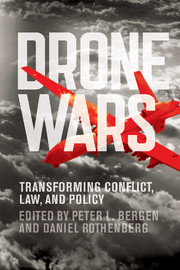Book contents
- Frontmatter
- Contents
- Contributors
- Acknowledgments
- Introduction
- Part I Drones on the Ground
- 1 My Guards Absolutely Feared Drones
- 2 Decade of the Drone
- 3 Just Trust Us
- 4 The Boundaries of War?
- 5 What Do Pakistanis Really Think About Drones?
- Part II Drones and the Laws of War
- Part III Drones and Policy
- Part IV Drones and the Future of War
- Index
- References
3 - Just Trust Us
The Need to Know More About the Civilian Impact of US Drone Strikes
Published online by Cambridge University Press: 05 December 2014
- Frontmatter
- Contents
- Contributors
- Acknowledgments
- Introduction
- Part I Drones on the Ground
- 1 My Guards Absolutely Feared Drones
- 2 Decade of the Drone
- 3 Just Trust Us
- 4 The Boundaries of War?
- 5 What Do Pakistanis Really Think About Drones?
- Part II Drones and the Laws of War
- Part III Drones and Policy
- Part IV Drones and the Future of War
- Index
- References
Summary
As a general proposition … I want to make sure that people understand that actually, drones have not caused a huge number of civilian casualties. For the most part they have been precise, precision strikes against al-Qaeda and their affiliates and we are very careful in terms of how it’s been applied.
President Barack Obama, January 2012The Importance of the Civilian Impact of US Drone Strikes
The US government claims that its covert drone program has little impact on the civilian populations in Pakistan, Yemen, and Somalia, where unmanned aerial vehicles are used to strike al-Qaeda and its affiliates. There is reason to believe this may not be true. While the Obama administration began publicly acknowledging in 2009 the use of drones outside of the Afghanistan combat theater, many elements of the program remain secret, leaving serious questions about the impact of the program on civilians.
For many Americans, drones make all the sense in the world. The public is tired of its sons and daughters being killed in faraway places for seemingly abstract reasons. For policymakers, drones may appear like the antidote to the expense, exhaustion, and dubious results of US military actions in Afghanistan and Iraq. For military strategists, drones may be preferable to other weapons. They can stay in the air for far longer than fighter jets and other aircraft and gather information that may assist in accurate targeting, helping to distinguish between civilians and combatants. This is especially true where drones’ around-the-clock video surveillance is supported by good ground intelligence.
- Type
- Chapter
- Information
- Drone WarsTransforming Conflict, Law, and Policy, pp. 42 - 70Publisher: Cambridge University PressPrint publication year: 2014
References
- 1
- Cited by



